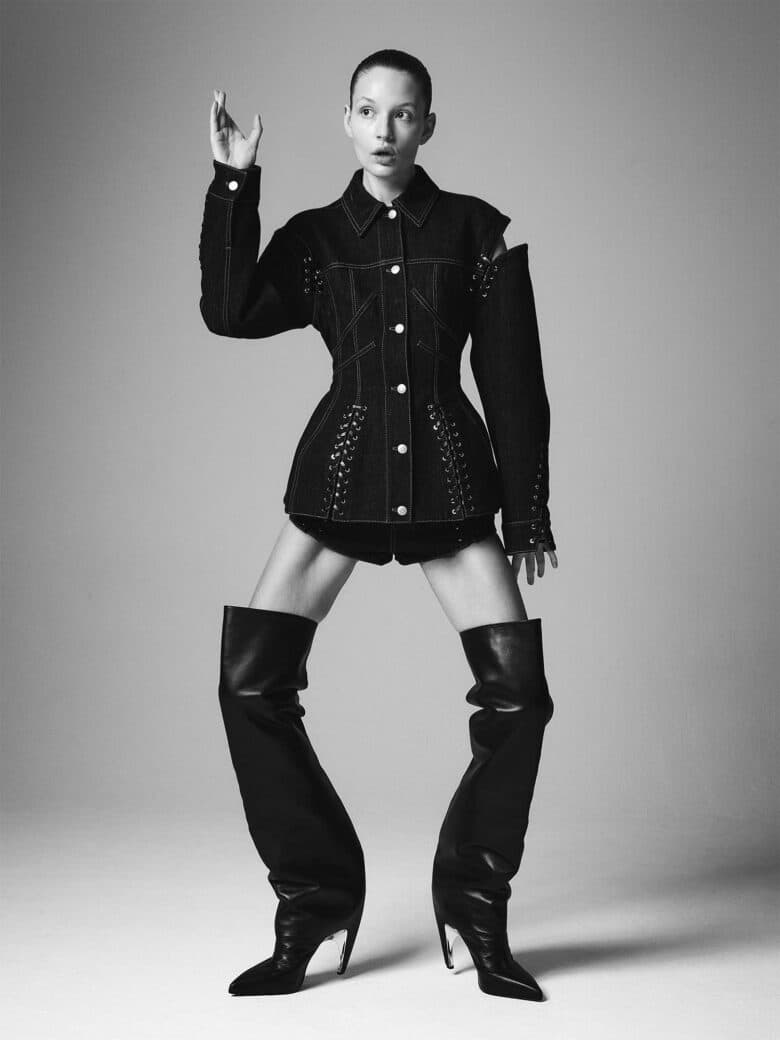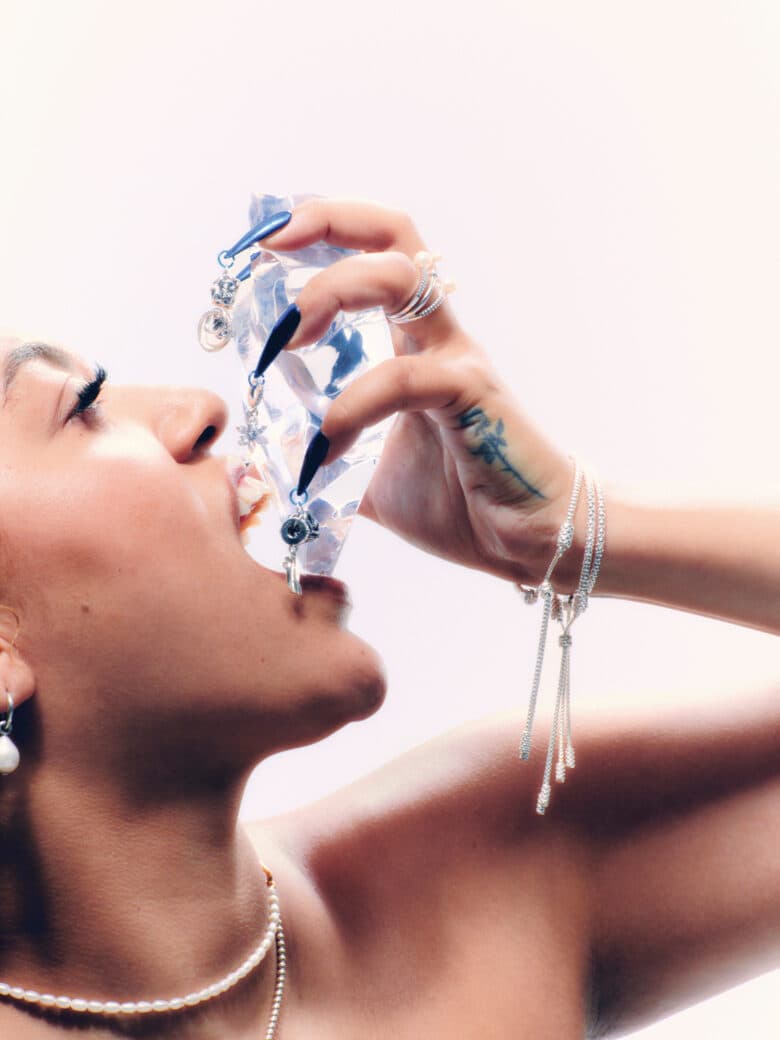It’s not just TikTokers at the People’s Choice Awards — “influencification” is everywhere

In yet another instance of us nosing into a celebrity’s private conversation, it was at the People’s Choice Awards that singer Billie Eilish was overheard telling Kylie Minogue that “there’s some, like, TikTokers here.” As the short clip made waves online, it emerged that people more or less agreed with Eilish. “this is why TikTokers don’t need to be at celebrity events” is the caption accompanying a video of Harry Daniels asking Barbie Ferreira if she’d rather have a “gay son” or a “thot daughter”. “TikTokers have no business being at award shows,” said another. Keep scrolling through X and you’ll see it’s unanimous: despite repeatedly descending on these kinds of events with no signs of stopping, online personalities aren’t exactly a desired presence on the red carpet. But is it elitist to think that?
Running to the defence of influencers like Harry Daniels – who’s famous for ambushing celebrities with his singing – doesn’t come easily. It’s made even harder given these influencers are so quick to run to their own defence: TikToker Bryce Hall uploaded a video deriding Eilish’s remark, captioning it: “I’m not sad, I’m disappointed”. Still, we probably owe them a semblance of recognition that it’s not entirely their fault that they’re shoved onto the same red carpets as their A-list counterparts. The producers of this year’s Golden Globes have talked at length about their planned effort to re-imagine the red carpet for Gen Z: by rolling out an onslaught of video content that included TikTok influencers like Matt Friend, the Golden Globes secured themselves over 130 million views on their TikTok, and 120 million on Instagram reels. In order to remedy the decreasing viewership these kinds of ceremonies attract, content from award shows is now predominantly spread via social media. To include the influencers that dominate these platforms in these award shows… Well, it makes unfortunate sense.
Take a step back, and you’ll see that online talent making their way into the un-online sphere is everywhere. Just days ago it was announced that Sabrina Brier – the TikToker behind skits that satirise female friendship – has joined the cast of comedy series Abbott Elementary. And in the UK, the influencer-to-presenter pipeline is seemingly irresistible. Last week it was announced that Made in Chelsea alumni Jamie Laing was being given a prime-time radio spot, and increasingly it’s former Love Island contestants that are taking the reins on hard-hitting documentaries. Zara McDermott has done one on everything from revenge porn to disordered eating, and Olivia Atwood just did one on plastic surgery. Within this sector of influencer discourse, it’s not so much about finding them to be an offensive presence at a glitzy gala, as it is about them stealing other people’s jobs. “i like jamie laing so no personal shade, but anyone else just completely despondent about the state of creative fields now? radio (like podcasting and interviewing and documentary making) is a trained skill but everyone is being overlooked for a reality star with a good agent [sic],” said one user on X.
But there is something more nuanced happening than these influencers stepping on someone else’s toes. Unifying all those tweets siding with Eilish is the idea that seeing Chris Olsen descend the carpet just moments after Sydney Sweeney (a bonafide star, no-matter how abstract the credentials that make her so) cheapens things a little. It dilutes the “old Hollywood” charm, and it might even dilute whatever art that awards ceremony is celebrating. Though that’s less true when it comes to something like the People’s Choice Award – which gives out awards like “Favourite TV Bromance” and “Favourite Daytime TV Host” – it’s a palpable and very real undercurrent to this discourse when it comes to prestige events like the Academy Awards or the Baftas. It might sound regressive and outdated to say so, but it seems that despite Hollywood’s best efforts, figures from the online sphere just don’t assimilate in the way they’d like. Take Emily Uribe’s stint interviewing at the Oscars last year. It’s not hard to discern that Uribe, who earned a TikTok following by parodying tenets of celebrity culture, is only granted permission to rub shoulders with a carefully selected few. And that’s fine, but it reveals that there’s a glaring conflict between what those high up want from these kinds of figures, and the limitations imposed by how they view (or look down on) them.
If they’re not interviewing the stars in attendance, the “influencerification” of these kinds of ceremonies comes in the form of someone like Haley Kalil, the model turned influencer who’s attended this year’s Grammys, Golden Globes and People’s Choice Awards. While her content from these is marginally more liked than some of her counterparts, it strikes an odd balance: though her ultra-pruned appearance and overall presence at these events demarcates her as somewhat of a celeb, she aligns herself with her 4.4 million followers by assuming the role of fangirl. Interactions with celebrities aren’t any more meaningful than making them the unwilling participant in TikTok trends or gawking at them. And this has mixed results. While for some she offers up a peak behind the curtain – “Hailey thank you for being our camera man for every event,” reads one comment – for others it makes for a painful watch. “They will never invite you again,” reads a comment on Kalil’s cringe-inducing interaction with Willem Dafoe. See also: Chris Olsen. Though the TikToker has made a career off celebrity interactions that his legion of fans could only wish for, it’s clear this hasn’t helped him become an actual celebrity. It was his presence at the People’s Choice Award that proved particularly divisive, and that solidified (for us, anyway) that he and many others of his ilk will forever be destined to that odd limbo.
There is a prerequisite to all of this though: that these award ceremonies are prestigious in the first place. Really, it could be argued that the Oscars lost its status as something “important” a long time ago, with attempts to get down with the kids falling flat on their face way before TikTokers rocked up on the carpet. It was certainly a watershed moment when model Ashley Graham interviewed actor Hugh Grant and mistook his mention of Vanity Fair, the book, for the Vanity Fair after party. You also have to wonder what’s going on in the heads of those behind the scenes to result in Ariana DeBose’s cringe-inducing musical number at last year’s Baftas. In this sense, the problem lies not with influencers themselves, but with the people that facilitate their awkward assimilation. Though they succeeded in carving out their place in the cultural consciousness of a younger generation, they simultaneously reduced Gen Z to an already outdated archetype. But Gen Z don’t want the “mother” or “slay” filled content that influencers like Haley Kalil and Chris Olsen bring to the table. In fact, if the popularity of the “old money” or “mob wife” aesthetics are anything to go by, they want quite the opposite. They want actual old Hollywood.
All of this isn’t to say that there aren’t any influencers who have successfully infiltrated. No matter what you think of their interviewing chops, Emma Chamberlain and Amelia Dimoldenburg feel like a decidedly hopeful presence in the influencer sphere. They’re definitely not A-listers, but they’re not Chris Olsen giving a bare-chested twirl either. Still, it’s hard to gauge their value outside their role in creating viral-ready moments or TikTok sound bites. Sure, that’s symptomatic of something going on in our broader culture, but it doesn’t stop their content from feeling so empty. If wanting something less transient and fleeting than that makes us elitist, then so be it.

